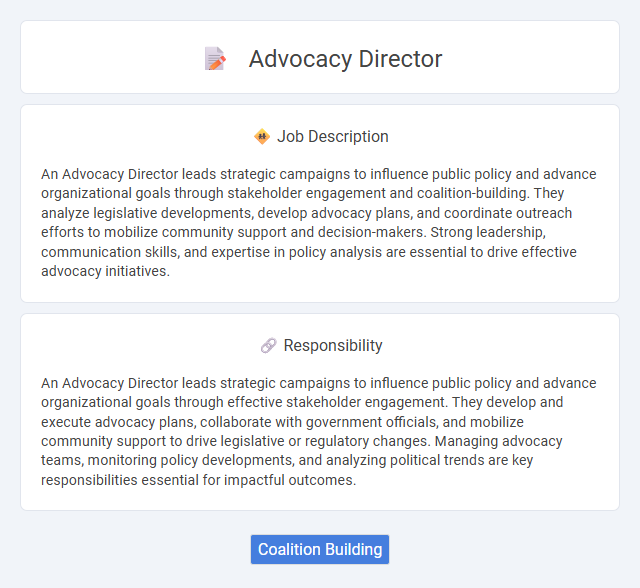
An Advocacy Director leads strategic campaigns to influence public policy and advance organizational goals through stakeholder engagement and coalition-building. They analyze legislative developments, develop advocacy plans, and coordinate outreach efforts to mobilize community support and decision-makers. Strong leadership, communication skills, and expertise in policy analysis are essential to drive effective advocacy initiatives.
Individuals with strong communication skills and a passion for social justice are likely to be well-suited for an Advocacy Director role. Those who thrive in fast-paced, high-pressure environments and have the ability to build relationships with diverse stakeholders may find this position suitable. People who prefer routine tasks or limited public interaction might find the job challenging or less compatible with their strengths.
Qualification
An Advocacy Director should possess a minimum of a bachelor's degree in public policy, political science, or a related field, with many roles requiring a master's degree for advanced strategic capabilities. Proven experience in leading advocacy campaigns, understanding legislative processes, and building coalitions is essential to effectively influence policy and public opinion. Strong communication, leadership skills, and knowledge of regulatory environments are critical to drive successful advocacy initiatives and stakeholder engagement.
Responsibility
An Advocacy Director leads strategic campaigns to influence public policy and advance organizational goals through effective stakeholder engagement. They develop and execute advocacy plans, collaborate with government officials, and mobilize community support to drive legislative or regulatory changes. Managing advocacy teams, monitoring policy developments, and analyzing political trends are key responsibilities essential for impactful outcomes.
Benefit
The role of an Advocacy Director likely offers significant benefits in influencing policy changes and advancing organizational missions. This position probably provides opportunities for professional growth through strategic leadership and stakeholder engagement. Employees may benefit from enhanced networking prospects and the ability to drive impactful social or political initiatives.
Challenge
The role of an Advocacy Director likely involves navigating complex political and social landscapes, requiring strategic communication and coalition-building skills to influence policy effectively. Challenges may arise from balancing diverse stakeholder interests while maintaining a clear organizational mission. Managing rapid changes in regulatory environments could also demand adaptability and foresight to sustain advocacy momentum.
Career Advancement
Advocacy Directors lead strategic campaigns to influence public policy, requiring strong leadership and communication skills to effectively mobilize stakeholders. Career advancement often involves progressing to senior executive roles such as Chief Advocacy Officer or Director of Government Relations, with growth driven by demonstrated success in shaping legislation and building coalitions. Expertise in policy analysis, stakeholder engagement, and public relations enhance prospects for higher-level positions within nonprofits, corporations, or government agencies.
Key Terms
Coalition Building
An Advocacy Director specializing in coalition building excels at uniting diverse stakeholders around shared policy goals to amplify collective influence. They strategically identify key partners, facilitate trust-based relationships, and coordinate joint actions to drive legislative or social change. Expertise in stakeholder mapping, communication strategies, and conflict resolution is crucial for successfully maintaining dynamic coalitions.
 kuljobs.com
kuljobs.com